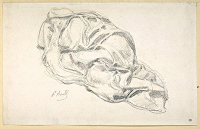 |
| Smiling elderly man - RGBStock.com |
TO CHEW ON: "Therefore we do not lost heart. Even though our outward man is perishing yet the inward man is being renewed day by day." 2 Corinthians 4:16
At our home group meetings we typically hear one prayer request after another for healing and better physical health (our group is made up of seniors). It illustrates how, after a certain age, the body wears out and falls prey to a variety of diseases and malignancies. Our "outward man is perishing."
But we are not to lose heart in this. Why? Because our "inward man is being renewed day by day."
But is it? Despite failing physical systems, a slower pace, loss of vitality, energy, brain power and drive, are we being renewed? How does this happen?A collection of verses under the heading "New Person" in my Bible gives some ideas of how this comes about.
Renewed day by day:
1. It starts with confession of and turning from sin on our part and a work of God's grace in our hearts - Ezekiel 18:30-31; Psalm 51:10.
2.By faith we accept that God is doing something in us - Philippians 2:13.
- A little further on in our 2 Corinthians reading Paul reminds us: "Therefore if anyone is in Christ he is a new creation—old things have passed away, all things have become new" - 2 Corinthians 5:17.
- There may be other evidences too. For Saul there were new powers of prophecy. Samuel promised him he would be "turned into another man" - 1 Samual 10:6.
3. But we don't just sit by waiting for ourselves to be magically changed. We cooperate with the Holy Spirit as He prompts us to live differently.
- We spend time with God. Isaiah talks about waiting on the Lord to renew strength (Isaiah 40:31).
- We cut away old habits and practices of sin and in this way identify or mark ourselves as God's possession. Paul refers to this in Colossians 2:11 as the "circumcision of Christ."
- We refuse to be defined by and conformed to our former lusts - 1 Peter 1:14.
- We put on the new man - Colossians 3:10.
4. We persevere despite physical failings and weakness.
- Our focus verse (2 Corinthians 4:16) reminds us not to lose heart despite the fact that physically we're wearing out.
- Philippians 1:6 reassures us that "He who has begun a good work in you will complete it until the day of Jesus Christ."
So, if our bodies are failing us and the state of our affairs is deteriorating rather than improving, we need to remind ourselves this is happening only in the physical, earth realm. In the meantime, our spiritual renewal can and should continue day by day till we pass from this life to the next.
PRAYER: Dear God, I pray that the day by day renewal Paul talks about here will happen in me. Help me to rise above the trials of a wearing out body and cooperate with You in this process. Amen.
PSALM TO PRAY: Psalm 150
*********
Unless otherwise noted all Scripture quotations are taken from the New King James Version®. Copyright © 1982 by Thomas Nelson, Inc. Used by permission. All rights reserved.














